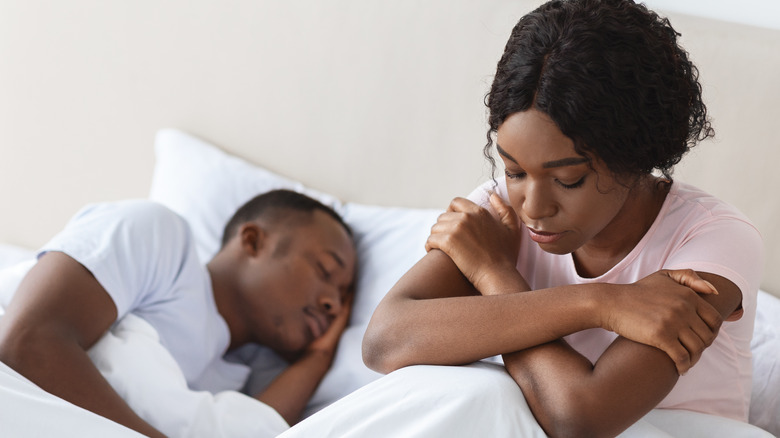Taking SSRIs? Here's How To Bring Up The Possible Libido Side Effects With Your Partner
According to the Centers for Disease Control and Prevention, between 2015 and 2018, 13.2% of U.S. adults reported taking at least one form of antidepressant within the past 30 days. Also known as selective serotonin reuptake inhibitors (SSRIs), these medications can be lifesaving for those who are struggling with mental illnesses, such as major depressive disorder or debilitating anxiety. Depending on the severity of the disorder, some people go their entire lives taking SSRIs.
As much as these medications can do wonders for mental health, they're not without their side effects. One of the most common issues for those on SSRIs is a decrease in libido, which also means it can affect partners as well. However, the reason for this isn't quite clear. According to a 2016 study published in Mental Health Clinician, researchers hypothesized that lowered libidos could be due to the increase of serotonin and their effect on hormones like dopamine and testosterone, as well as their ability to affect arousal and climax. But Harvard Medical School researchers have suggested it's not so much the SSRIs, but the depression itself that has led to lower libidos.
No matter the reason — SSRIs or the underlying depression — if your libido is affected, then you'll want to address it with your partner. Sex may not be the most important part of a relationship, but it's important enough that you can't simply ignore possible libido-related side effects, and you owe it to your partner to clue them into how you may be feeling.
What does the impact of SSRIs on sex drive look like
When it comes to SSRIs and libido, it doesn't always look the same. Because everyone is different, as are SSRIs and their effect on people, don't let yourself or your partner assume that being on antidepressants will automatically rob you of your sex drive.
Sex therapist and functional medicine psychiatrist Madeleine Castellanos tells Gene Sight:
"Antidepressant medication can interfere with libido, so that a patient has no or very little interest in sex ... It can also make arousal slow and sluggish, so people have trouble getting excited about sex ... And there are also well-documented effects on delayed orgasm, for both men and women. Some people are anorgasmic, or unable to reach orgasm, while on these medications. But there is a lot of variation ... It's hard to know if one patient or another will experience these kinds of side effects."
Because side effects aren't set in stone for anyone, no matter what SSRI you take, it opens the door to the possibility of trying another type of medication that may not completely kill your sexual desires. It's important to keep in mind that many people try multiple kinds of antidepressants before they find the one that fits the best — not just in regard to libido, but the effectiveness on their mental health as a whole.
How to explain to your partner what's happening
The first thing to keep in mind when it comes to talking to your partner about your libido is that it's pretty rare that both partners will have the exact same libido all the time. This is called desire discrepancy and, according to a 2015 study published in Personality and Social Psychology Bulletin, 80% of couples are affected by it. So, SSRIs or not, this is a common issue for couples.
But because we are discussing SSRIs, if your partner doesn't have any personal experience with them, trying to explain things can be tricky. It's like trying to explain to someone what it's like to live with any mental disorder if they've never experienced it. That's why it's essential to talk about it in a clear, communicative manner, in a way that ensures your partner understands that you're indeed attracted to them, and it's the medication preventing you from either becoming aroused or achieving orgasm. Together, you can figure out how you can navigate it. For example, trying different medications, lower dosages, or adding a different medication into the mix can help a decreased libido. Be sure to discuss these options with your doctor as well as with your partner.
If your partner loves you and supports whatever it takes to get you healthy, then there's a good chance your libido will come second to that. It also may not be permanent. How we respond to medication can change over time, so nothing is definitive and your libido just might come back with a vigor that blows both your minds.


